Unit 2 Topic 1 You should brush your teeth twice a day.语法知识点课件(共23张PPT) 仁爱科普版八年级英语上册
文档属性
| 名称 | Unit 2 Topic 1 You should brush your teeth twice a day.语法知识点课件(共23张PPT) 仁爱科普版八年级英语上册 | 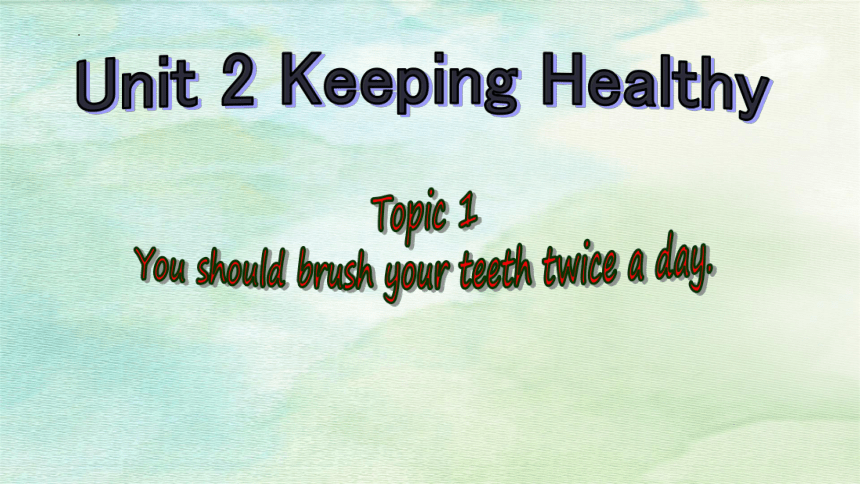 | |
| 格式 | pptx | ||
| 文件大小 | 4.9MB | ||
| 资源类型 | 教案 | ||
| 版本资源 | 仁爱科普版 | ||
| 科目 | 英语 | ||
| 更新时间 | 2024-12-16 17:10:08 | ||
图片预览

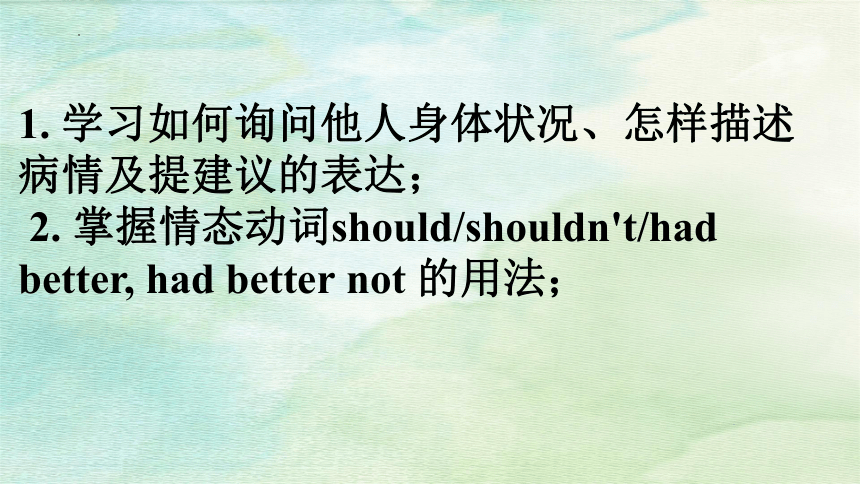
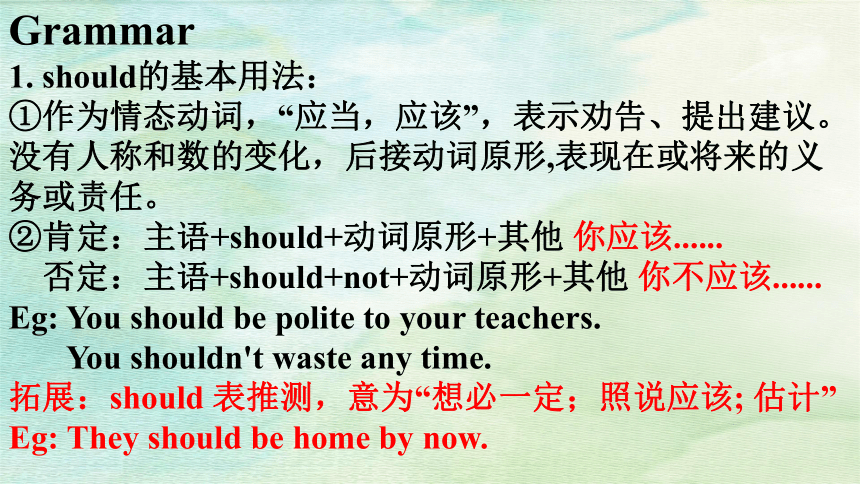

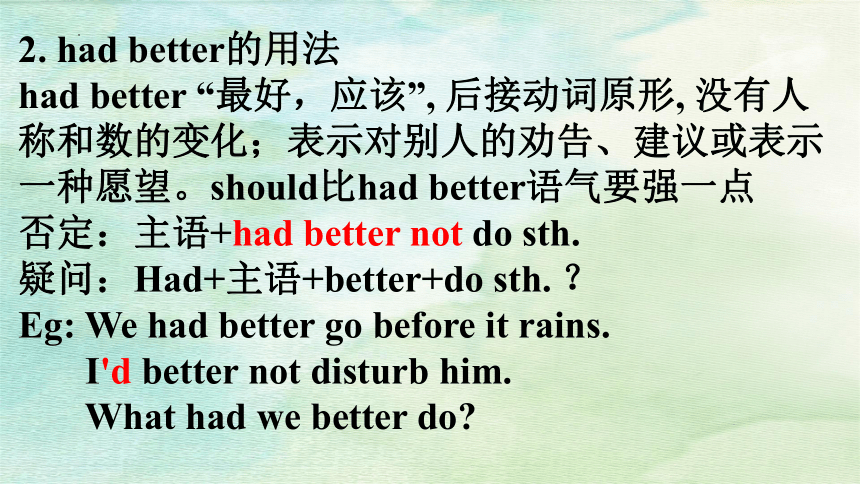
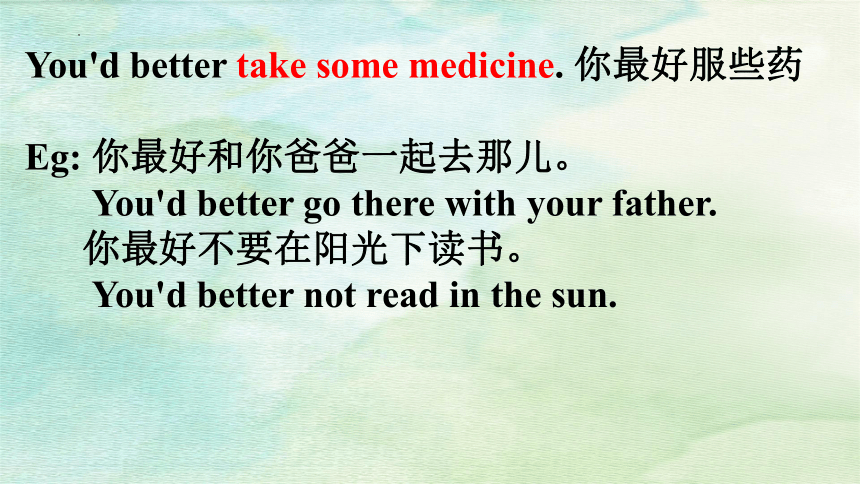
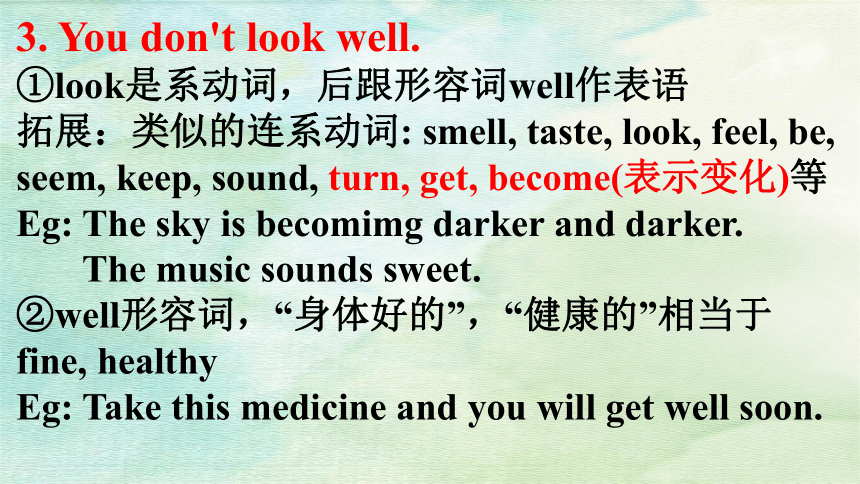
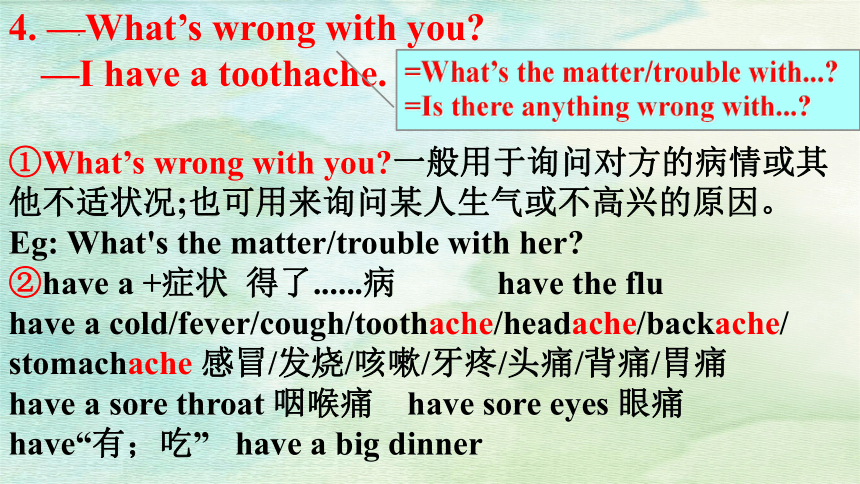
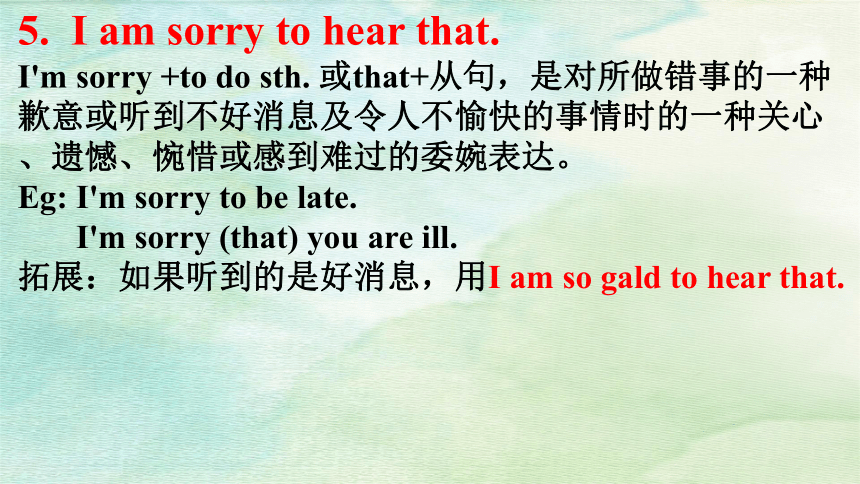
文档简介
(共23张PPT)
Unit 2 Keeping Healthy
Topic 1
You should brush your teeth twice a day.
1. 学习如何询问他人身体状况、怎样描述病情及提建议的表达;
2. 掌握情态动词should/shouldn't/had better, had better not 的用法;
Grammar
1. should的基本用法:
①作为情态动词,“应当,应该”,表示劝告、提出建议。没有人称和数的变化,后接动词原形,表现在或将来的义务或责任。
②肯定:主语+should+动词原形+其他 你应该......
否定:主语+should+not+动词原形+其他 你不应该......
Eg: You should be polite to your teachers.
You shouldn't waste any time.
拓展:should 表推测,意为“想必一定;照说应该; 估计” Eg: They should be home by now.
You should see a dentist. 你应该去看牙医。
see a dentist/doctor
表示提建议,还可以用shall, shall 通常用于第一人称。
①请求给予建议 How shall I make cakes
②主动提供帮助 Shall I help you
③提建议 Shall we go swimming
2. had better的用法
had better “最好,应该”, 后接动词原形, 没有人称和数的变化;表示对别人的劝告、建议或表示一种愿望。should比had better语气要强一点
否定:主语+had better not do sth.
疑问:Had+主语+better+do sth. ?
Eg: We had better go before it rains.
I'd better not disturb him.
What had we better do
You'd better take some medicine. 你最好服些药
Eg: 你最好和你爸爸一起去那儿。
You'd better go there with your father.
你最好不要在阳光下读书。
You'd better not read in the sun.
3. You don't look well.
①look是系动词,后跟形容词well作表语
拓展:类似的连系动词: smell, taste, look, feel, be, seem, keep, sound, turn, get, become(表示变化)等
Eg: The sky is becomimg darker and darker.
The music sounds sweet.
②well形容词,“身体好的”,“健康的”相当于fine, healthy
Eg: Take this medicine and you will get well soon.
4. —What’s wrong with you
—I have a toothache.
①What’s wrong with you 一般用于询问对方的病情或其他不适状况;也可用来询问某人生气或不高兴的原因。
Eg: What's the matter/trouble with her
②have a +症状 得了......病 have the flu
have a cold/fever/cough/toothache/headache/backache/ stomachache 感冒/发烧/咳嗽/牙疼/头痛/背痛/胃痛
have a sore throat 咽喉痛 have sore eyes 眼痛
have“有;吃” have a big dinner
=What’s the matter/trouble with... =Is there anything wrong with...
5. I am sorry to hear that.
I'm sorry +to do sth. 或that+从句,是对所做错事的一种歉意或听到不好消息及令人不愉快的事情时的一种关心、遗憾、惋惜或感到难过的委婉表达。
Eg: I'm sorry to be late.
I'm sorry (that) you are ill.
拓展:如果听到的是好消息,用I am so gald to hear that.
6. Betty suggests that Kangkang should see a dentist.
① “suggest +名词”
Eg: He suggested a walk.
② “suggest doing sth.”
Eg: I suggest putting the meeting off.
③ “suggest (that) +从句”
Eg: He suggested (that) we (should) come another
day.
7. How long have you been like this
have been 现在完成时态;
现在完成时态表示过去发生或已经完成的动作对现在造成的影响或结果;也可以用来表示发生在过去某一时刻的,持续到现在的动作。
构成:主语+have/has+动词的过去分词
Eg: 我已经学英语一年多了。
I have learned English for over one year.
Practice
1. I have a headache.
You should ________________________________.
stay in bed and have a good sleep
2. I have a fever.
drink enough boiled water
You should _______________________________.
3. I can’t sleep well at night.
You shouldn't _______________________________.
drink coffee or tea in the evening
4. I have a backache.
You shouldn't _______________________________.
lift heavy things
You _________ brush your teeth twice a day.
You shouldn’t eat too much candy.
I have _________.
Fill in the blanks according to the pictures.
should/
had better
a toothache
I have a fever.
You _________________ stay in bed and have a good rest.
You _________________ drink lots of boiled water.
should/had better
should/had better
I have sore eyes.
You ______________________ work on the Internet so long.
You _________________ take good care of your eyes.
shouldn’t/ had better not
should/had better
I have a toothache.
Pair work
Make conversations after the example.
Example:
What’s wrong/the matter with you
3
You shouldn’t eat too much candy. / You should brush your teeth twice a day.
I have He/She has the flu.
a fever.
a toothache.
a stomachache.
a backache.
You He/She had better should had better not shouldn’t lie down and rest.
see a dentist.
drink lots of boiled water.
drink cold water.
work too long.
eat too much candy.
eat hot food.
New words and phrases can be learnt better if you make your own meaningful sentences with them.
8.You should lie down and have a rest.
lie “躺”; 过去式 lay 过去分词 lain 现在分词 lying
lie v. 撒谎 n. 谎言
tell a lie 撒谎 lie to sb. 对某人撒谎
9. Maria flew her kite while Michael played on his
skateboard.
while “当......的时候 ”,表示两件事情同时发生
辨析:when, while “当......的时候 ”,都可作从属连词,但二者有区别
①while: during the time that, 只用于指一段时间(从句的谓语动词必须是延续性), 从句与主句的谓语动词所表示的动作只能同时发生。
Eg: My mother was washing clothes while I was reading.
②when: at or during the time that, 既可用于指一点时间(从句的谓语动词必须是短暂性),也可用于指一段时间(从句的谓语动词必须是延续性),从句与主语的谓语动词所表示的动作或状态能同时发生,或一先一后发生。
Eg: John wants to help others when they are ill.
When Tony opened the door, he found there was a bag lying on the ground.
10. So I'd like to ask for one week's leave.
①ask for sth. 请求;恳求
② leave 不可数名词 “休假”
a week's leave two weeks' leave = a two-week leave
③leave v. 离开,留下
leave for 动身去某地 leave sth. behind. 把......留下
Eg: He left for Shanghai two weeks ago.
Be careful! Don't leave anything behind.
1. 应该/不应该做某事
2. 最好做/不要做某事
3. 看牙医
4. 服药
5. 牙痛/背痛/头痛
6. 重感冒
7. 发烧
8. 患流感
9. 建议做某事
10. 请求,恳求
11. 请一周的假
1. should/shouldn't do sth.
2. had better(not) do sth.
3. see a dentist
4. take some medicine/pills
5. have a toothache/backache/headache
6. have a bad cold
7. have a fever
8. have the flu
9. suggest doing sth.
10. ask for
11. ask for one week's leave.
Thank you !
Unit 2 Keeping Healthy
Topic 1
You should brush your teeth twice a day.
1. 学习如何询问他人身体状况、怎样描述病情及提建议的表达;
2. 掌握情态动词should/shouldn't/had better, had better not 的用法;
Grammar
1. should的基本用法:
①作为情态动词,“应当,应该”,表示劝告、提出建议。没有人称和数的变化,后接动词原形,表现在或将来的义务或责任。
②肯定:主语+should+动词原形+其他 你应该......
否定:主语+should+not+动词原形+其他 你不应该......
Eg: You should be polite to your teachers.
You shouldn't waste any time.
拓展:should 表推测,意为“想必一定;照说应该; 估计” Eg: They should be home by now.
You should see a dentist. 你应该去看牙医。
see a dentist/doctor
表示提建议,还可以用shall, shall 通常用于第一人称。
①请求给予建议 How shall I make cakes
②主动提供帮助 Shall I help you
③提建议 Shall we go swimming
2. had better的用法
had better “最好,应该”, 后接动词原形, 没有人称和数的变化;表示对别人的劝告、建议或表示一种愿望。should比had better语气要强一点
否定:主语+had better not do sth.
疑问:Had+主语+better+do sth. ?
Eg: We had better go before it rains.
I'd better not disturb him.
What had we better do
You'd better take some medicine. 你最好服些药
Eg: 你最好和你爸爸一起去那儿。
You'd better go there with your father.
你最好不要在阳光下读书。
You'd better not read in the sun.
3. You don't look well.
①look是系动词,后跟形容词well作表语
拓展:类似的连系动词: smell, taste, look, feel, be, seem, keep, sound, turn, get, become(表示变化)等
Eg: The sky is becomimg darker and darker.
The music sounds sweet.
②well形容词,“身体好的”,“健康的”相当于fine, healthy
Eg: Take this medicine and you will get well soon.
4. —What’s wrong with you
—I have a toothache.
①What’s wrong with you 一般用于询问对方的病情或其他不适状况;也可用来询问某人生气或不高兴的原因。
Eg: What's the matter/trouble with her
②have a +症状 得了......病 have the flu
have a cold/fever/cough/toothache/headache/backache/ stomachache 感冒/发烧/咳嗽/牙疼/头痛/背痛/胃痛
have a sore throat 咽喉痛 have sore eyes 眼痛
have“有;吃” have a big dinner
=What’s the matter/trouble with... =Is there anything wrong with...
5. I am sorry to hear that.
I'm sorry +to do sth. 或that+从句,是对所做错事的一种歉意或听到不好消息及令人不愉快的事情时的一种关心、遗憾、惋惜或感到难过的委婉表达。
Eg: I'm sorry to be late.
I'm sorry (that) you are ill.
拓展:如果听到的是好消息,用I am so gald to hear that.
6. Betty suggests that Kangkang should see a dentist.
① “suggest +名词”
Eg: He suggested a walk.
② “suggest doing sth.”
Eg: I suggest putting the meeting off.
③ “suggest (that) +从句”
Eg: He suggested (that) we (should) come another
day.
7. How long have you been like this
have been 现在完成时态;
现在完成时态表示过去发生或已经完成的动作对现在造成的影响或结果;也可以用来表示发生在过去某一时刻的,持续到现在的动作。
构成:主语+have/has+动词的过去分词
Eg: 我已经学英语一年多了。
I have learned English for over one year.
Practice
1. I have a headache.
You should ________________________________.
stay in bed and have a good sleep
2. I have a fever.
drink enough boiled water
You should _______________________________.
3. I can’t sleep well at night.
You shouldn't _______________________________.
drink coffee or tea in the evening
4. I have a backache.
You shouldn't _______________________________.
lift heavy things
You _________ brush your teeth twice a day.
You shouldn’t eat too much candy.
I have _________.
Fill in the blanks according to the pictures.
should/
had better
a toothache
I have a fever.
You _________________ stay in bed and have a good rest.
You _________________ drink lots of boiled water.
should/had better
should/had better
I have sore eyes.
You ______________________ work on the Internet so long.
You _________________ take good care of your eyes.
shouldn’t/ had better not
should/had better
I have a toothache.
Pair work
Make conversations after the example.
Example:
What’s wrong/the matter with you
3
You shouldn’t eat too much candy. / You should brush your teeth twice a day.
I have He/She has the flu.
a fever.
a toothache.
a stomachache.
a backache.
You He/She had better should had better not shouldn’t lie down and rest.
see a dentist.
drink lots of boiled water.
drink cold water.
work too long.
eat too much candy.
eat hot food.
New words and phrases can be learnt better if you make your own meaningful sentences with them.
8.You should lie down and have a rest.
lie “躺”; 过去式 lay 过去分词 lain 现在分词 lying
lie v. 撒谎 n. 谎言
tell a lie 撒谎 lie to sb. 对某人撒谎
9. Maria flew her kite while Michael played on his
skateboard.
while “当......的时候 ”,表示两件事情同时发生
辨析:when, while “当......的时候 ”,都可作从属连词,但二者有区别
①while: during the time that, 只用于指一段时间(从句的谓语动词必须是延续性), 从句与主句的谓语动词所表示的动作只能同时发生。
Eg: My mother was washing clothes while I was reading.
②when: at or during the time that, 既可用于指一点时间(从句的谓语动词必须是短暂性),也可用于指一段时间(从句的谓语动词必须是延续性),从句与主语的谓语动词所表示的动作或状态能同时发生,或一先一后发生。
Eg: John wants to help others when they are ill.
When Tony opened the door, he found there was a bag lying on the ground.
10. So I'd like to ask for one week's leave.
①ask for sth. 请求;恳求
② leave 不可数名词 “休假”
a week's leave two weeks' leave = a two-week leave
③leave v. 离开,留下
leave for 动身去某地 leave sth. behind. 把......留下
Eg: He left for Shanghai two weeks ago.
Be careful! Don't leave anything behind.
1. 应该/不应该做某事
2. 最好做/不要做某事
3. 看牙医
4. 服药
5. 牙痛/背痛/头痛
6. 重感冒
7. 发烧
8. 患流感
9. 建议做某事
10. 请求,恳求
11. 请一周的假
1. should/shouldn't do sth.
2. had better(not) do sth.
3. see a dentist
4. take some medicine/pills
5. have a toothache/backache/headache
6. have a bad cold
7. have a fever
8. have the flu
9. suggest doing sth.
10. ask for
11. ask for one week's leave.
Thank you !
同课章节目录
- Unit 1 Playing Sports
- Topic 1 I'm going to play basketball.
- Topic 2 I'll kick you the ball again.
- Topic 3 The school sports meet is coming.
- Unit 2 Keeping Healthy
- Topic 1 You should brush your teeth twice a day.
- Topic 2 I must ask him to give up smoking.
- Topic 3 Must we exercise to prevent the flu?
- Unit 3 Our Hobbies
- Topic 1 What's your hobby?
- Topic 2 What sweet music!
- Topic 3 What were you doing at this time yesterday
- Unit 4 Our World
- Topic 1 What's the strongest animal on the farm?
- Topic 2 How can we protect ourselves from the eart
- Topic 3 The Internet makes the world smaller.
